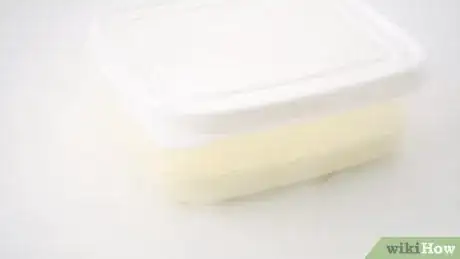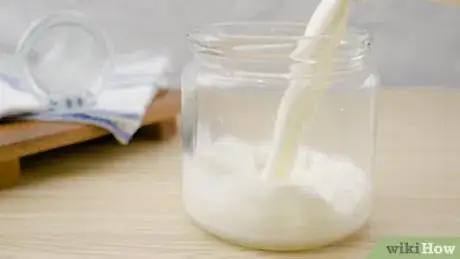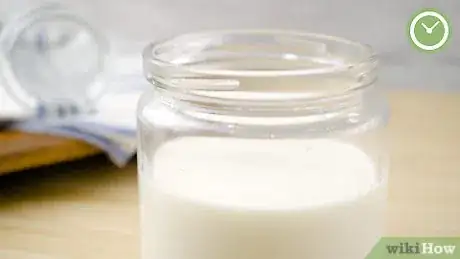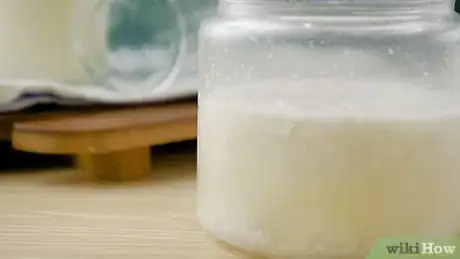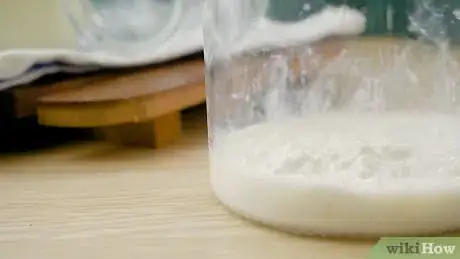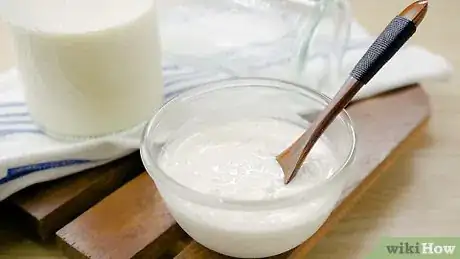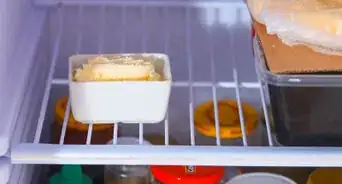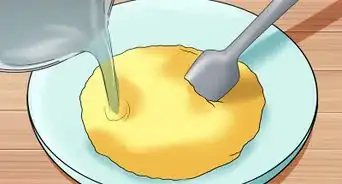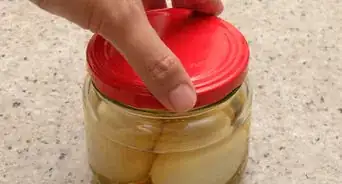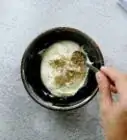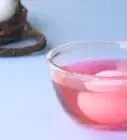This article was co-authored by wikiHow Staff. Our trained team of editors and researchers validate articles for accuracy and comprehensiveness. wikiHow's Content Management Team carefully monitors the work from our editorial staff to ensure that each article is backed by trusted research and meets our high quality standards.
There are 10 references cited in this article, which can be found at the bottom of the page.
The wikiHow Video Team also followed the article's instructions and verified that they work.
This article has been viewed 2,850,884 times.
Learn more...
Oh no! You’ve assembled all of the ingredients for your recipe, only to find that your cream carton has pulled a vanishing act. There’s no need to worry, though; as long as you have whole milk and butter on hand, you can make your own heavy cream and whipping cream from scratch. We’ve outlined some quick and easy substitutions to help you get started. Only have non-homogenized milk? We’ve got you covered there, too—scroll to the bottom of the article for a quick guide on how to separate the cream from your milk.
Ingredients
- 3⁄4 cup (180 mL) cold milk (2% or whole)
- ⅓ cup (75 g) unsalted butter
Makes 1 cup (240 mL) heavy cream
- 1⁄4 cup (59 mL) cold water
- 2 teaspoons (10 g) unflavored gelatin
- 1 cup (240 mL) whole milk
- ¼ cup (30 g) powdered sugar
- ½ tablespoon (7.5 mL) vanilla extract
Makes about 2 cups (470 mL) whipped cream
- Non-homogenized milk
Amounts vary
Steps
Making Heavy Cream from Milk
-
1Melt the unsalted butter in a saucepan over low-heat. Place ⅓ cup (75 g) of unsalted butter into a saucepan. Turn the heat up to low, and wait for the butter to melt; you can stir it occasionally with a spoon or rubber spatula.[1]
Do not use margarine or salted butter, as the resulting heavy cream won't taste right.
-
2Stir 1 tablespoon (15 mL) of the melted butter into the cold milk. This is known as "tempering" and is very important. If you pour all of the melted butter into the milk at once, the milk will heat up too fast and curdle.[2]
- Whole milk will give you the best results, but you can use 2% milk as well.
- Do this in a separate container; a large measuring cup would be ideal.
- You are using the entire 3⁄4 cup (180 mL) of cold milk for this step.
Advertisement -
3Pour the milk into the rest of the butter and cook it over low-heat. Pour the tempered milk into the saucepan containing the rest of the butter. Turn the heat up to low and wait for the milk to heat up, stirring it often with a whisk. Once the milk starts to steam, you are ready for the next step.[3]
- Do not let the milk come to a boil.
-
4Mix the cream until it thickens. A blender will work the best, but you can use a food processor, an electric mixer, or even a hand-held mixer. How long it takes for the cream to thicken depends on which tool you use; expect it to take a few minutes, however.
- You are looking for a thick, creamy consistency--just like heavy cream.
- This recipe will not thicken into a whipped cream consistency.
-
5Keep the cream in the fridge and use it within 1 week. Allow the mixture to cool to room temperature first, then transfer it into a lidded container and put it into the fridge. You can use this as a substitute for most recipes that call for heavy cream.[4]
The cream will separate over time. If that happens, simply give the container a good shake. You can also reheat it over low-heat, then give it a stir.
Making Whipped Cream
-
1Combine water and unflavored gelatin, then wait 5 minutes. Pour 1⁄4 cup (59 mL) of cold water into a small or medium-sized saucepan. Sprinkle 2 teaspoons (10 g) of unflavored gelatin over the water. Wait 5 minutes for the gelatin to absorb the water and turn spongy. Do not turn the heat on the stove just yet.[5]
- If you don't have gelatin or prefer not to use it, use agar agar instead.[6]
- For a richer cream, use 1⁄4 cup (59 mL) of cold whole milk instead of water.[7]
- Do not use Jello or flavored gelatin. It contains additional sugars and flavors, which may affect the overall flavor of the cream.
-
2Cook the mixture over low-heat until it turns clear, stirring often. This should only take a few minutes. It the mixture takes too long to heat up, use medium-low heat instead. Once the gelatin dissolves and the water turns clear, you're ready for the next step.[8]
Note that if you used milk, the mixture will not turn clear. Simply wait for the granules or flakes to dissolve.
-
3Let the mixture cool, then whisk it into whole milk for a few seconds. Take the saucepan off the burner and set it aside so that it can cool to room temperature. Next, pour 1 cup (240 mL) of milk into a bowl, then add in the cooled gelatin mixture. Stir it with a whisk for about 20 to 30 seconds to combine.[9]
- How long it takes for the gelatin mixture to cool depends on the temperature in your kitchen. It will probably take around 10 to 15 minutes.
- You must use whole milk, as it has a higher fat content. Other types of milk won't give you the same results due to their low-fat content.
-
4Whisk in the powdered sugar and vanilla extract. Pour in ½ tablespoon (7.5 mL) of vanilla extract and ¼ cup (30 g) of powdered sugar. Stir the mixture once more with a whisk until the color and texture are consistent, and no streaks or lumps remain.[10]
- You can use a different type of extract if you prefer a different flavor, such as almond.
- You must use powdered, icing, or confectioners sugar. Do not use regular, granulated sugar.
- For a less-sweet cream, use just 2 tablespoons (15 g) of powdered and omit the vanilla extract.[11]
-
5Refrigerate the mixture for about 90 minutes, stirring it every 15 minutes. Cover the bowl with plastic wrap, and place it in the fridge. Every 15 to 20 minutes, take the bowl out of the fridge, give the mixture a brief stir with a whisk, then put it back into the fridge. Do this a few more times until 60 to 90 minutes have passed.[12]
- As the mixture sits in the fridge, the ingredients will start to come together and thicken. Whisking the mixture will prevent the ingredients from separating.
- For better results, chill your whisk as well. This will help speed up the overall process and prevent separating.[13]
-
6Whip the mixture with a hand-held mixer until it turns creamy. Take the bowl out of the fridge and begin to whip the mixture with a hand-held mixer. Keep mixing until the mixture thickens and starts to form soft peaks.[14]
- Make sure that you go all around the edges of the bowl as you mix. The cream will double in size as you whip it.
- How long this takes depends on the temperature of the cream, the speed of your mixer, and your desired consistency. It shouldn't take more than a few seconds, however.
- If you don't have a hand-held mixer, you can use an electric mixer or a food processor fitted with whisks instead.
-
7Store the whipped cream in the fridge for up to 2 days. A glass jar or bottle with a lid will work the best. Not only will it help preserve the flavor, but it will be more convenient to use. Avoid plastic containers, as the chemicals can leach into the cream and affect the flavor.[15]
- Although this cream is similar to what you would get with heavy cream, it is not quite the same thing.
- It is best used for toppings (i.e.: waffles, pancakes, strawberries, etc.) or cake fillings.
Separating Cream from Milk
-
1Pour the non-homogenized milk into a glass jar. You will be sticking a ladle into this jar, so a wide-mouthed jar will be easier to work with than a standard jar with a smaller mouth. Make sure that the jar is clean.[16]
- If your milk is already in a glass jar, you can skip this step.
- This method will only work with non-homogenized milk. It won't work with homogenized milk because homogenized milk doesn't contain any extra cream.
- The easiest way to tell if milk is non-homogenized is to check the label when buying it. If the milk comes in a glass container, you can also look for the cream line.
-
2Let fresh milk rest for 24 hours. You can use non-homogenized milk from the store, or you can use fresh non-homogenized milk straight from the cow. If it is the latter, you will need to let the milk sit for at least 24 hours.[17]
- Fresh milk has not separated fully. These 24 hours will give the cream time to rise to the top of the milk.
-
3Find the line where the milk and cream separate. This is known as the "cream line." The milk is more translucent than the cream, and lighter in color. The cream is thicker and more yellowish. The milk will be towards the bottom of the jar while the cream will be towards the top.[18]
- The "cream line" won't look like a drawn line, but rather like separated salad dressing, with the liquid on the bottom and the oil on the top.
- If you can't find the line, the milk and cream might need more time to separate. It's also possible that you bought homogenized milk.
-
4Dip a ladle into the cream, above the cream line. Choose a soup or sauce ladle that is small enough to fit through the mouth of your jar. Dip it straight into the cream. Do not dip it so far down so that it reaches the milk, however; you just want to pick up the cream.[19]
- If the cream line is too thin for a ladle, use a turkey baster instead.
-
5Scoop the cream out and transfer it into a separate container. Lift the ladle out of the jar, and transfer the cream into a separate jar. If you do not have another jar, you can use a bowl or another glass container--as long as it has a lid.[20]
- If you are using a turkey baster, be careful not to pick up any milk. You may not be able to release the bulb all the way.
-
6Repeat the process until you have about 1 inch (2.5 cm) of cream left. Leaving some cream in the milk jar will reduce the chances of you accidentally getting milk into your cream jar. The extra cream will also give the milk a better texture, similar to that of whole milk.[21]
- If you get milk into the cream, it will mess up any whipped cream or butter that you decide to make with it. It'll be like getting water into whipped cream or butter.
-
7Use the separated milk and cream as desired. You can use the milk for cooking and drinking; you can even add it to your cereal or coffee. The separated cream is ideal for making whipped cream or butter.[22]
- Cover both jars with lids and keep them in the fridge.
- Use the milk and cream within 1 week.
Community Q&A
-
QuestionHow do you store cream?
 wikiHow Staff EditorThis answer was written by one of our trained team of researchers who validated it for accuracy and comprehensiveness.
wikiHow Staff EditorThis answer was written by one of our trained team of researchers who validated it for accuracy and comprehensiveness.
Staff Answer wikiHow Staff EditorStaff AnswerCream is best kept covered in its original container and refrigerated. After purchase, place it into the refrigerator as soon as you arrive home. Use the cream by its use-by date or within 1 week after opening the container. Double cream can be kept frozen for up to 3 weeks.
wikiHow Staff EditorStaff AnswerCream is best kept covered in its original container and refrigerated. After purchase, place it into the refrigerator as soon as you arrive home. Use the cream by its use-by date or within 1 week after opening the container. Double cream can be kept frozen for up to 3 weeks. -
QuestionCan gelatin be replaced by agar?
 Community AnswerYes it can, but I recommend trying to to make sure it doesn't affect the taste.
Community AnswerYes it can, but I recommend trying to to make sure it doesn't affect the taste. -
QuestionWhen I try the method in the article, the mixture does not thicken after it has cooled. What am I doing wrong?
 Community AnswerYou may not be mixing the gelatin properly, it takes some time to thicken.
Community AnswerYou may not be mixing the gelatin properly, it takes some time to thicken.
Things You'll Need
Making Heavy Cream
- Saucepan
- Bowl
- Whisk
- Blender or food processor
- Jar or lidded container
Making Whipped Cream
- Saucepan
- Whisk
- Electric or hand-held mixer
- Large mixing bowl
Separating Cream from Milk
- 2 glass jars
- Ladle
References
- ↑ https://sixdollarfamily.com/how-to-make-a-heavy-cream-substitute
- ↑ https://sixdollarfamily.com/how-to-make-a-heavy-cream-substitute
- ↑ https://sixdollarfamily.com/how-to-make-a-heavy-cream-substitute
- ↑ https://sixdollarfamily.com/how-to-make-a-heavy-cream-substitute
- ↑ https://www.youtube.com/watch?v=C63dz2JlA9g&feature=youtu.be&t=30s
- ↑ https://www.biggerbolderbaking.com/turn-milk-into-whipped-cream/
- ↑ https://www.biggerbolderbaking.com/turn-milk-into-whipped-cream/
- ↑ https://www.youtube.com/watch?v=C63dz2JlA9g&feature=youtu.be&t=48s
- ↑ https://www.youtube.com/watch?v=C63dz2JlA9g&feature=youtu.be&t=1m10s
- ↑ https://www.youtube.com/watch?v=C63dz2JlA9g&feature=youtu.be&t=1m45s
- ↑ https://www.biggerbolderbaking.com/turn-milk-into-whipped-cream/
- ↑ https://www.youtube.com/watch?v=C63dz2JlA9g&feature=youtu.be&t=2m
- ↑ http://www.gourmetsleuth.com/articles/detail/twenty-ways-with-whipped-cream
- ↑ https://www.youtube.com/watch?v=C63dz2JlA9g&feature=youtu.be&t=2m30s
- ↑ https://www.biggerbolderbaking.com/turn-milk-into-whipped-cream/
- ↑ http://www.theprairiehomestead.com/2015/03/separate-cream-from-milk.html
- ↑ http://www.theprairiehomestead.com/2015/03/separate-cream-from-milk.html
- ↑ http://www.theprairiehomestead.com/2015/03/separate-cream-from-milk.html
- ↑ http://www.theprairiehomestead.com/2015/03/separate-cream-from-milk.html
- ↑ http://www.theprairiehomestead.com/2015/03/separate-cream-from-milk.html
- ↑ http://www.theprairiehomestead.com/2015/03/separate-cream-from-milk.html
- ↑ http://www.theprairiehomestead.com/2015/03/separate-cream-from-milk.html
About This Article
To make heavy cream from milk, first melt 1/3 cup (75 g) of butter in a bowl in the microwave. Then, add 2/3 cup (150 g) of whole milk to the bowl, and stir together with a wooden spoon. Once the butter and milk are completely mixed together, you're done! To make whipped cream, first pour ¼ cup (60 g) of cold, whole milk into a large bowl. Scatter 2 teaspoons (6 g) of powdered, unflavored gelatin over the surface of the milk and let it sit for 5 minutes. After 5 minutes the mixture should look spongy. Next, heat the mixture in the microwave for 10 to 20 seconds to turn it back into a liquid. Then, pour 1 cup (240 ml) of whole milk into a separate bowl, and stir in 2 tablespoons of powdered sugar (25 g). Combine the contents of both bowls and whisk for 20 to 30 seconds. Place the bowl in the fridge for 20 minutes. Finally, beat the mixture with an electric mixer until the milk becomes thick and doubles in size. To learn how to make whipped cream from milk, read on!
